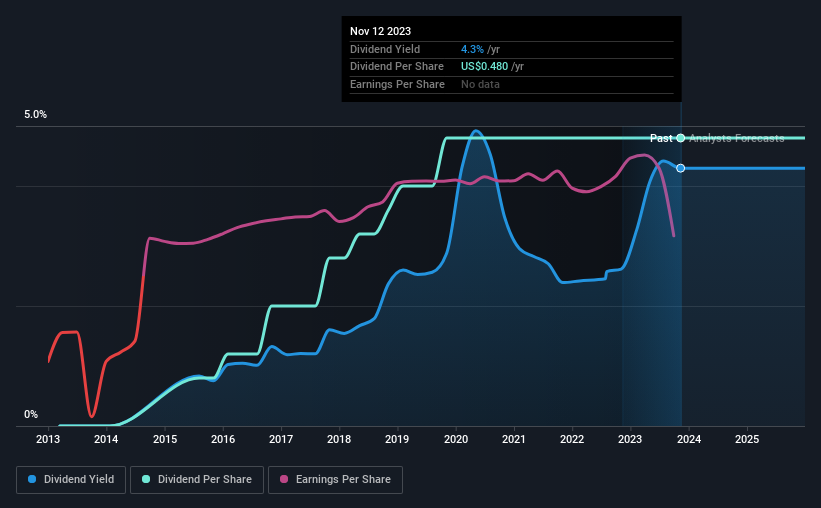Dividend Investors: Don't Be Too Quick To Buy Shore Bancshares, Inc. (NASDAQ:SHBI) For Its Upcoming Dividend
It looks like Shore Bancshares, Inc. (NASDAQ:SHBI) is about to go ex-dividend in the next three days. The ex-dividend date is one business day before a company's record date, which is the date on which the company determines which shareholders are entitled to receive a dividend. The ex-dividend date is important as the process of settlement involves two full business days. So if you miss that date, you would not show up on the company's books on the record date. This means that investors who purchase Shore Bancshares' shares on or after the 16th of November will not receive the dividend, which will be paid on the 30th of November.
The company's next dividend payment will be US$0.12 per share. Last year, in total, the company distributed US$0.48 to shareholders. Calculating the last year's worth of payments shows that Shore Bancshares has a trailing yield of 4.3% on the current share price of $11.17. Dividends are a major contributor to investment returns for long term holders, but only if the dividend continues to be paid. As a result, readers should always check whether Shore Bancshares has been able to grow its dividends, or if the dividend might be cut.
View our latest analysis for Shore Bancshares
If a company pays out more in dividends than it earned, then the dividend might become unsustainable - hardly an ideal situation. It paid out 89% of its earnings as dividends last year, which is not unreasonable, but limits reinvestment in the business and leaves the dividend vulnerable to a business downturn. We'd be worried about the risk of a drop in earnings.
Generally speaking, the lower a company's payout ratios, the more resilient its dividend usually is.
Click here to see the company's payout ratio, plus analyst estimates of its future dividends.
Have Earnings And Dividends Been Growing?
Businesses with shrinking earnings are tricky from a dividend perspective. If business enters a downturn and the dividend is cut, the company could see its value fall precipitously. Readers will understand then, why we're concerned to see Shore Bancshares's earnings per share have dropped 12% a year over the past five years. When earnings per share fall, the maximum amount of dividends that can be paid also falls.
Many investors will assess a company's dividend performance by evaluating how much the dividend payments have changed over time. Shore Bancshares has delivered an average of 25% per year annual increase in its dividend, based on the past eight years of dividend payments. That's intriguing, but the combination of growing dividends despite declining earnings can typically only be achieved by paying out a larger percentage of profits. Shore Bancshares is already paying out a high percentage of its income, so without earnings growth, we're doubtful of whether this dividend will grow much in the future.
To Sum It Up
From a dividend perspective, should investors buy or avoid Shore Bancshares? We're not overly enthused to see Shore Bancshares's earnings in retreat at the same time as the company is paying out more than half of its earnings as dividends to shareholders. These characteristics don't generally lead to outstanding dividend performance, and investors may not be happy with the results of owning this stock for its dividend.
Although, if you're still interested in Shore Bancshares and want to know more, you'll find it very useful to know what risks this stock faces. Be aware that Shore Bancshares is showing 4 warning signs in our investment analysis, and 1 of those can't be ignored...
A common investing mistake is buying the first interesting stock you see. Here you can find a full list of high-yield dividend stocks.
Have feedback on this article? Concerned about the content? Get in touch with us directly. Alternatively, email editorial-team (at) simplywallst.com.
This article by Simply Wall St is general in nature. We provide commentary based on historical data and analyst forecasts only using an unbiased methodology and our articles are not intended to be financial advice. It does not constitute a recommendation to buy or sell any stock, and does not take account of your objectives, or your financial situation. We aim to bring you long-term focused analysis driven by fundamental data. Note that our analysis may not factor in the latest price-sensitive company announcements or qualitative material. Simply Wall St has no position in any stocks mentioned.

